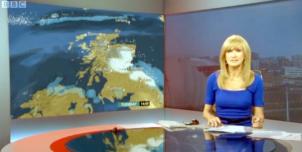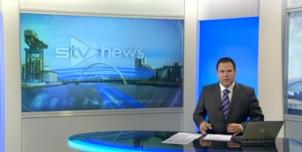Full Freeview on the Black Hill (North Lanarkshire, Scotland) transmitter
| Google Streetview | Google map | Bing map | Google Earth | 55.861,-3.874 or 55°51'40"N 3°52'27"W | ML7 4NZ |
The symbol shows the location of the Black Hill (North Lanarkshire, Scotland) transmitter which serves 940,000 homes. The bright green areas shown where the signal from this transmitter is strong, dark green areas are poorer signals. Those parts shown in yellow may have interference on the same frequency from other masts.
This transmitter has no current reported problems
The BBC and Digital UK report there are no faults or engineering work on the Black Hill (North Lanarkshire, Scotland) transmitter._______
Digital television services are broadcast on a multiplexes (or Mux) where many stations occupy a single broadcast frequency, as shown below.
64QAM 8K 3/4 27.1Mb/s DVB-T MPEG2
DTG-12 QSPK 8K 3/4 8.0Mb/s DVB-T MPEG2
H/V: aerial position (horizontal or vertical)
Which Freeview channels does the Black Hill transmitter broadcast?
If you have any kind of Freeview fault, follow this Freeview reset procedure first.Digital television services are broadcast on a multiplexes (or Mux) where many stations occupy a single broadcast frequency, as shown below.
64QAM 8K 3/4 27.1Mb/s DVB-T MPEG2
DTG-12 QSPK 8K 3/4 8.0Mb/s DVB-T MPEG2
H/V: aerial position (horizontal or vertical)
Which BBC and ITV regional news can I watch from the Black Hill transmitter?

BBC Reporting Scotland 2.4m homes 9.2%
from Glasgow G51 1DA, 26km west (271°)
to BBC Scotland region - 230 masts.

STV News 1.3m homes 4.8%
from Glasgow G51 1PQ, 26km west (271°)
to STV Central (Glasgow) region - 94 masts.
Are there any self-help relays?
| Ardtornish A | Transposer | 22 km NW Oban | 15 homes |
| Balquhidder | Transposer | 12 km NW Callander | 42 homes |
| Benmore B | Active deflector | 50 m WNW Glasgow | 7 homes |
| Blair Drummond | Transposer | 5 homes caravan park | |
| Blyth Bridge | Active deflector | 30 km SW Edinburgh | 50 homes |
| Glendaruel | Active deflector | 40 hotel | 40 homes hotel |
| Glendaruel B | Active deflector | 12 homes (second level) |
How will the Black Hill (North Lanarkshire, Scotland) transmission frequencies change over time?
| 1957-80s | 1984-97 | 1997-98 | 1998-2011 | 2011-13 | 3 Oct 2018 | ||||
| VHF | B E T | B E T | B E T | E T | W T | ||||
| C10 | ITVwaves | ||||||||
| C30 | _local | ||||||||
| C32 | com7 | ||||||||
| C35 | com8 | ||||||||
| C37 | C5waves | C5waves | |||||||
| C40 | BBC1waves | BBC1waves | BBC1waves | BBCB | BBCB | ||||
| C41 | +SDN | SDN | |||||||
| C43 | ITVwaves | ITVwaves | ITVwaves | D3+4 | D3+4 | ||||
| C44 | ArqA | ArqA | |||||||
| C46 | BBC2waves | BBC2waves | BBC2waves | BBCA | BBCA | ||||
| C47 | ArqB | ArqB | |||||||
| C50tv_off | C4waves | C4waves | C4waves | ||||||
| C51tv_off | LG | ||||||||
| C55tv_off | com7tv_off | ||||||||
| C56tv_off | _local | COM8tv_off |
tv_off Being removed from Freeview (for 5G use) after November 2020 / June 2022 - more
Table shows multiplexes names see this article;
green background for transmission frequencies
Notes: + and - denote 166kHz offset; aerial group are shown as A B C/D E K W T
waves denotes analogue; digital switchover was 8 Jun 11 and 22 Jun 11.
How do the old analogue and currrent digital signal levels compare?
| Analogue 1-5 | 500kW | |
| SDN, ARQA, ARQB, BBCA, D3+4, BBCB | (-7dB) 100kW | |
| com7 | (-10.7dB) 42.9kW | |
| com8 | (-11.1dB) 39.2kW | |
| Mux 1*, Mux 2*, Mux A*, Mux B*, Mux C*, Mux D* | (-14dB) 20kW | |
| LG | (-20dB) 5kW |
Local transmitter maps
Black Hill Freeview Black Hill DAB Black Hill TV region BBC Scotland STV Central (Glasgow micro region)Which companies have run the Channel 3 services in the Black Hill transmitter area
|
|
Monday, 23 May 2016
The TV displays 'weak or no signal'are you sure this is due to a too strong a signal as I need to use a booster to watch anything,without I get the same display as HD on SD?
| link to this comment |
Tuesday, 24 May 2016
MikeP
4:53 PM
Trowbridge
4:53 PM
Trowbridge
Alexei Romanov:
Yes it can be caused by too much signal! That's why we contributors ask people to tell us what the reported signal strength is on the multiplexes they are having problems with.
Please check the actual strengths reported by your TV set and give make/model of same please. Note that we are asking for strength readings and not quality figures.
In you case, I conjecture that you may have too much gain in your amplifier. Too much signal is not a good thing, it was not good in the 'old' analogue TV days and is even worse for digital signals, expecially the HD ones.
We await your strength figures, etc.
| link to this comment |
MikeP's: mapM's Freeview map terrainM's terrain plot wavesM's frequency data M's Freeview Detailed Coverage
Thursday, 26 May 2016
J
jb3812:11 AM
alexei romanov : Irrespective of any other advice given, as these intermittent problems with reception stretch back to around August last year, one thing I haven't seen mentioned as yet is if they are also being experienced by others in your "immediate" vicinity, i.e: neighbours?, as knowing whether they are or not would at least allow the elimination of one of the two possible causes of said problem, that of (1) a deficiency in your
installation, or (2) due to external factors remote to your household, likewise beyond your control.
My reason for enquiring is basically due to the fact that although you are indicated as having a clear line-of-sight with the Blackhill transmitter its only just and no more, as the terrain (ground only) signal path indicator (Megalithia) shows the signal skimming over a high spot of land at approx 1.5 miles prior to your location, the area in question roughly coinciding with two ranges of trees located to the East side of the M8 motorway, the first (and worst from the TX) being on either side of the old Greenock road a tad to the North of the high voltage overhead line distribution depot.
Reception in situations such as described can on occasions (usually weather / atmospheric dependant) have an element of the erratic involved, trees having a dastardly effect on the data carried by RF signals, this resulting in some muxes being affected whereas others aren't, although any that are usually suffer from quality related issues and not necessarily strength, which in many cases can remain high.
Therefore, the next time you see a weak or no signal warning on BBC HD, go into your TV's tuning menu and select "manual tune" followed by entering C40 / 626.0 MHz into the channel box but "not" followed by pressing search or scan, as in most Freeview devices if any signal is being received, nomatter how low it might be, the strength and quality of the signal will appear on the indicator bars.
However, that said is on the assumption that if any HDMI type cables are being used in your installation to connect your TV into other devices or vice-versa, that said cables are "not " running close to the aerial lead, as the radiation emitted from some HDMI cables can be of a frequency selective nature, i.e: affecting some Mux numbers and not others.
Further advice dependant on reply.
| link to this comment |
jb38: Most of the neighbours are on cable or satellite. The set only gives signal quality and I use shielded OFC cables.At present all channels are fine.I don't watch a lot of television, mostly listening to Dab radio which can sometimes go as well.
| link to this comment |
Saturday, 28 May 2016
Sunday, 29 May 2016
J
jb3811:51 PM
alexei romanov: If the problem referred to is still in existence? try removing the aerial connection then reinserting same "whilst you are viewing the screen", the purpose of being to see if the picture flashes on the screen then off again the instant you remove the aerial connection.
If though it doesn't, then try switching the TV or box off for 10 seconds or so before switching it back on again, checking if this action has resolved the problem. If any of the two procedures have? then this is inclined to point to a deficiency in your TV or boxes software.
By the way, as you have mentioned that your Freeview device does not have individual strength and quality indications, it would be of assistance to know the model number of the device in question.
| link to this comment |
Monday, 30 May 2016
jb38: I have now found signal strength(Support, self diagnosis ) 68,and bit error can be as high as 200 on BBC1HD.The signals just went again on HD channels.
| link to this comment |
J
jb385:05 PM
alexei romanov : If you have now found how to access your Freeview receivers support menu and are able to view the BER level, 200 being a measure of the data corruption on the signal received which on a good installation is zero, however, BER indications (quality in non technical terms) are always accompanied by signal strength, should this now be the case, what level is it indicated as being?
I also noticed in your reply to MikeP (May 23rd / 7.11pm) you had said that you need to use the booster to watch anything, if you are now able to view signal strength on its own? I would like you to try a test by leaving your Freeview device on BBCHD, noting the signal strength / BER level then see what happens by removing the booster from the equation.
The reason for this being, that receiving a signal that's a tad too strong for a tuners front end will nearly always result in false level readings being obtained, i.e: strength usually indicating much lower than it actually is but always accompanied by a high bit error rate (BER).
I would also be interested to know the dB level indicated on your booster, that is in addition to the model number of your Freeview receiver, as this enables specifications to be checked.
| link to this comment |
Sunday, 5 June 2016
jb38 The signals have gone again on BBC and also HD channels.STV and other channels are fine though I don't want to watch them.BBC signal strength was down from 68 to 48 and bit error 2000.
| link to this comment |
Monday, 6 June 2016
Select more comments
Your comment please!





